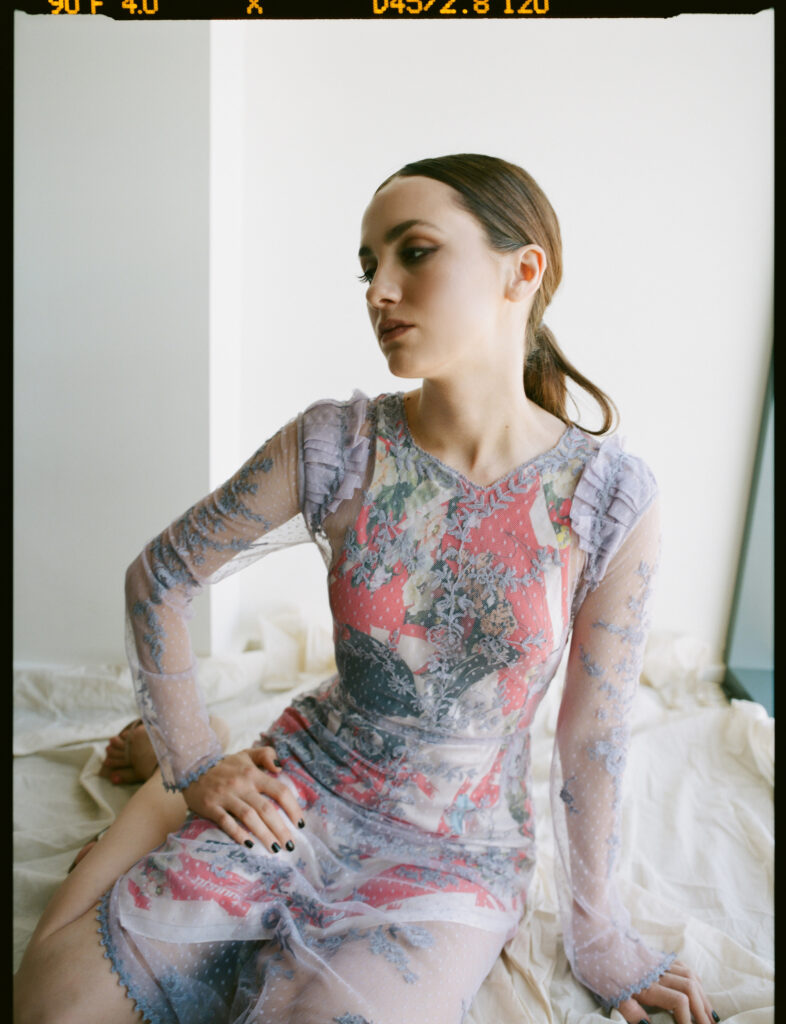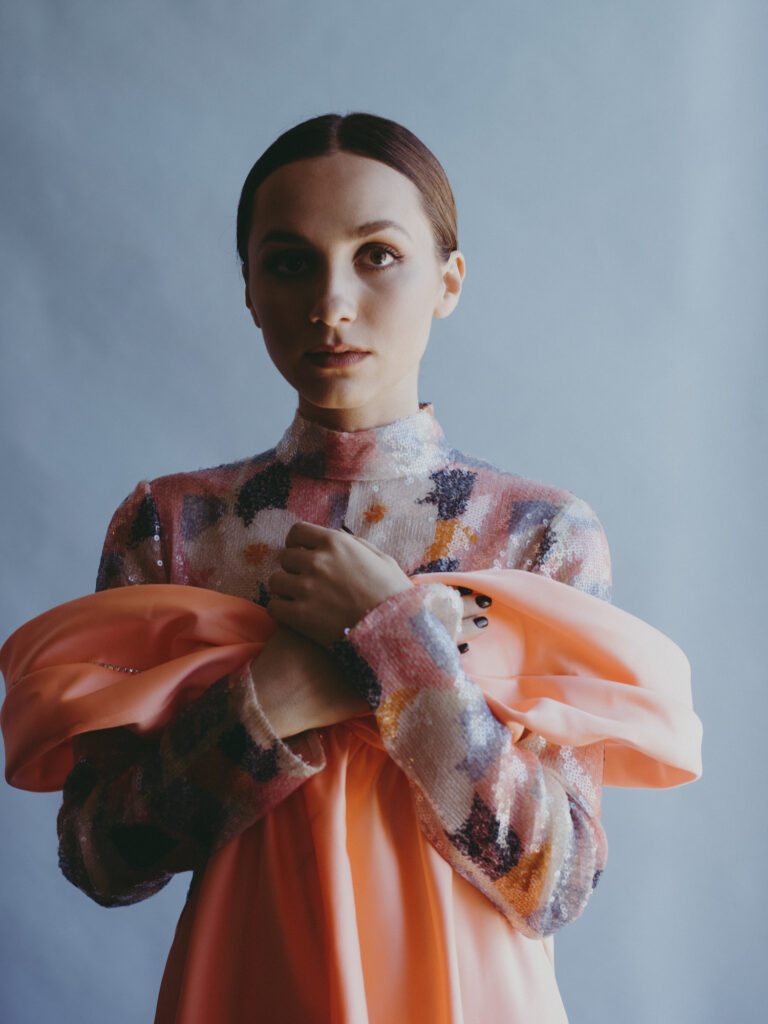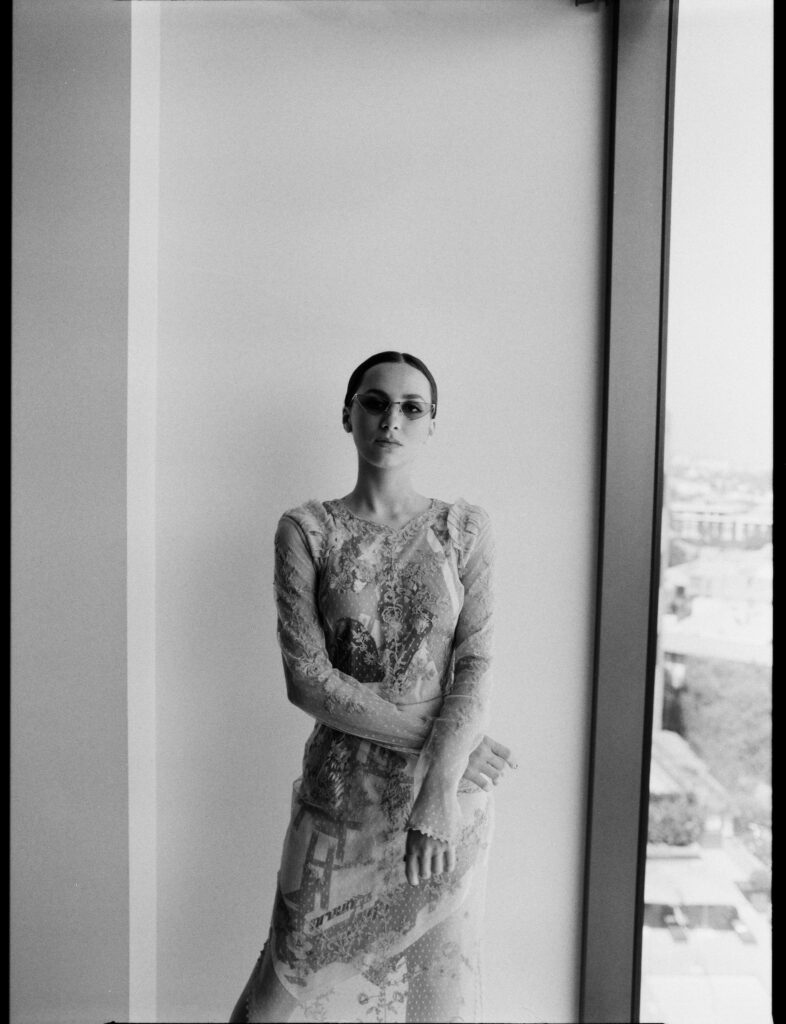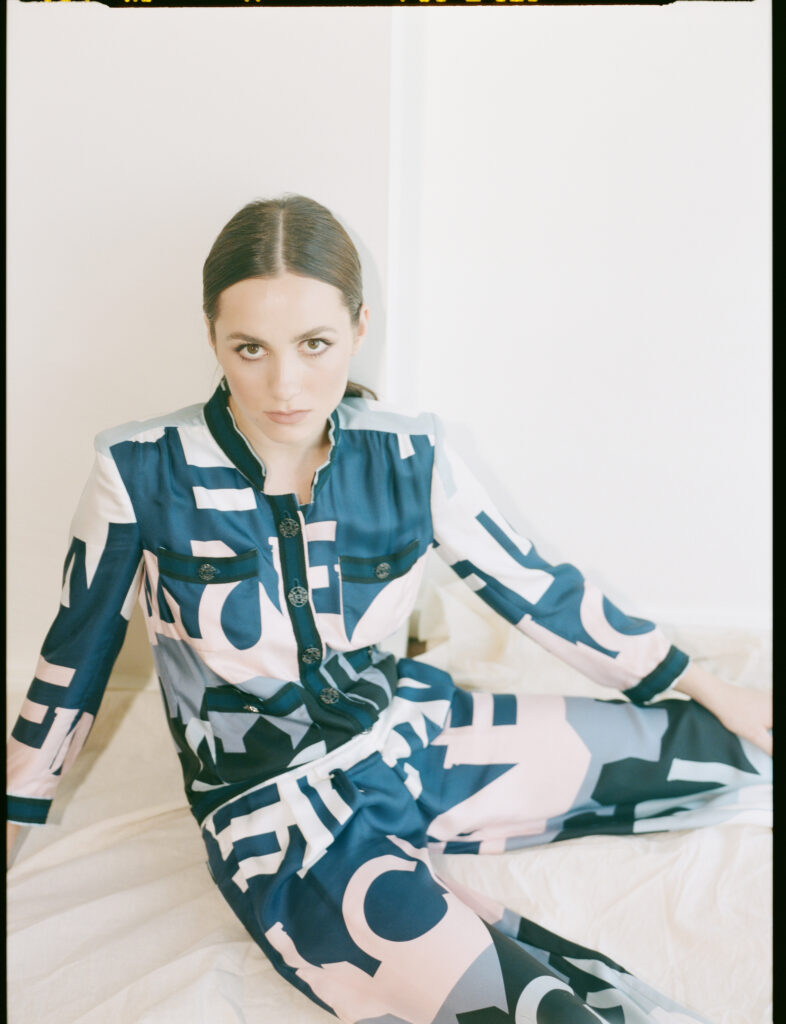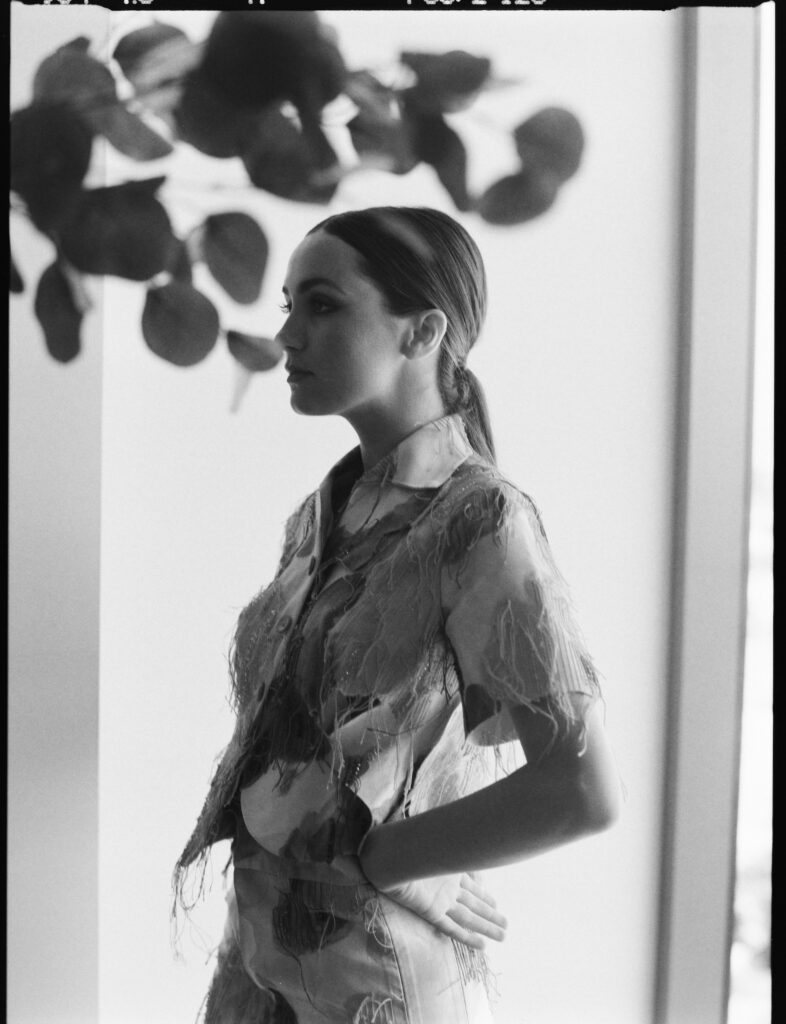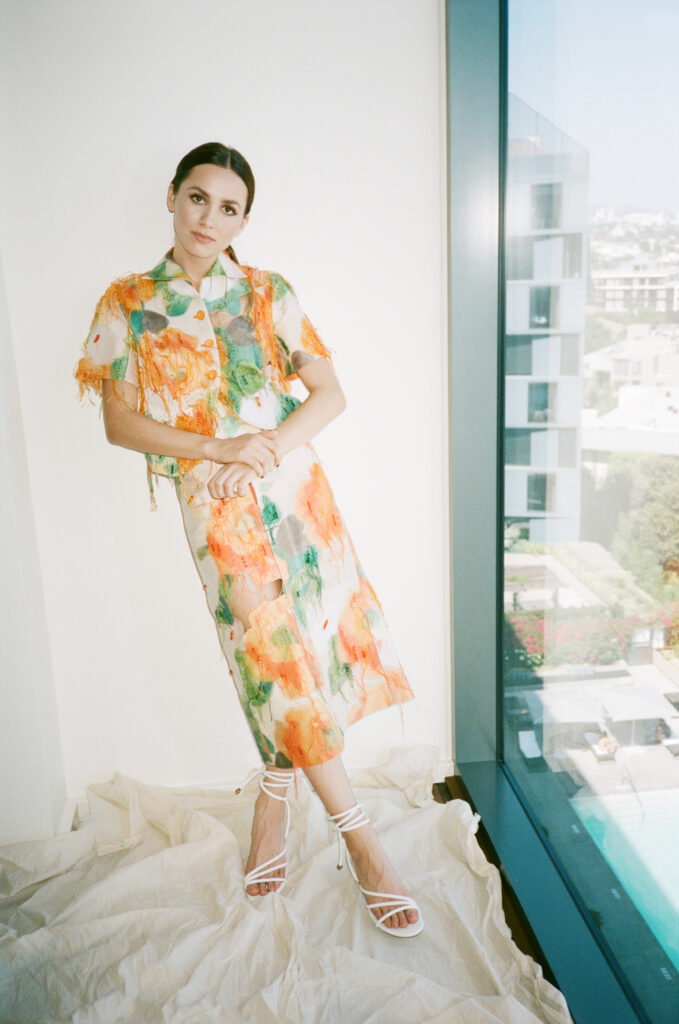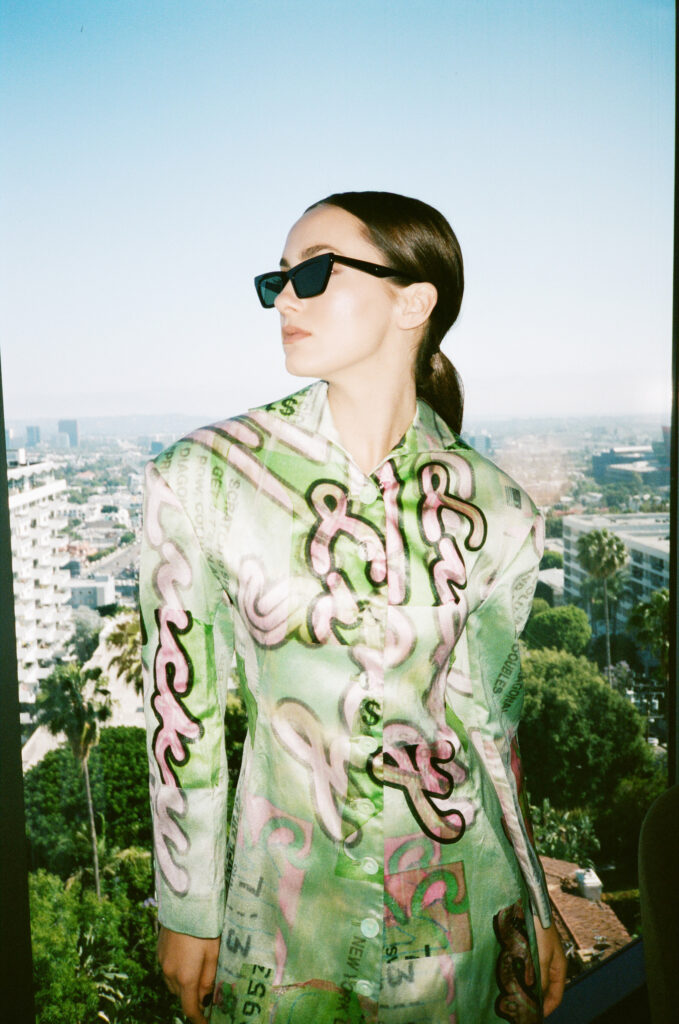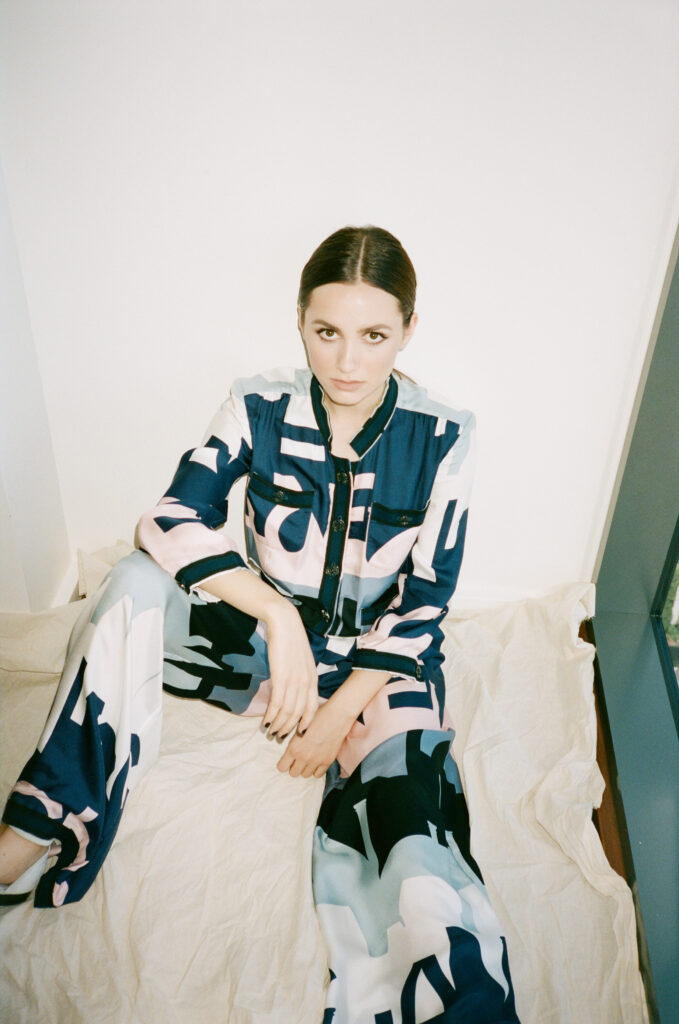Laura Albert Interviews Maude Apatow for ContentMode
MA: My dad told me to say hello, because I told him that you’re interviewing me. He told me that he knew you, he’d met you.
LA: That’s so wonderful! I met him at a dinner with the Milches at Valentino.
MA: Oh my God, he looks up to David so much. My whole life he’s been telling me advice that he’s gotten from him and is now conveying to me. My dad loves him so much. I’ve heard so many good things about him.
LA: Did you watch Deadwood?
MA: I haven’t seen Deadwood. Maybe that should be my next… So you wrote on it right?
LA: Well, it’s all David. I was invited down to the set as an episode writer. He took me in when all the shit was hitting the fan for me, and he protected me. He understood what my writing was expressing and why I needed to express it the way that I did. You’re three months older than my son, he was on Deadwood and it’s funny cause he’s just watching it now too and it’s blowing his mind. Because at the time he didn’t even know what a whore was. He would say to me, “Mom you could make more money if you were a whore”! [both laugh] He grew up with the David Milch language and wisdom too. You grew up in an artistic world with access to such creativity. I’ve loved your father’s work, and what extends to your performances is a felt authenticity and love – that underneath there is this kind of support. I just watched the short film you wrote and directed, “Don’t Mind Alice”, it’s so well-done Maude.
MA: Thank you! Oh my God I didn’t know you watched it!
LA: You really convey this confused experience from the inside, I was having panic attacks watching it – but laughing too. I was like “NO! NO! It’s not your fault!” [both laugh] You know you understand the innocence – or maybe just the stupidity – of some kids. Your film really captured that pre-frontal-cortex-closure state. You co-wrote the script with Olivia Rosenbloom?
MA: Yeah, my best friend and I wrote it together. Olivia and I are writing partners, and we were just talking about – I was going through having obsessive negative thoughts, about people around me getting hurt or something bad happening, and then sort of like obsessing over what I would do in a particular situation. So we were like, how can we turn that into a funny short, within this kind of dark framework, and that’s how we came up with the idea. Sort of doing all the wrong things when something bad happened, being in that panic state. We made “Don’t Mind Alice” a few years ago now.
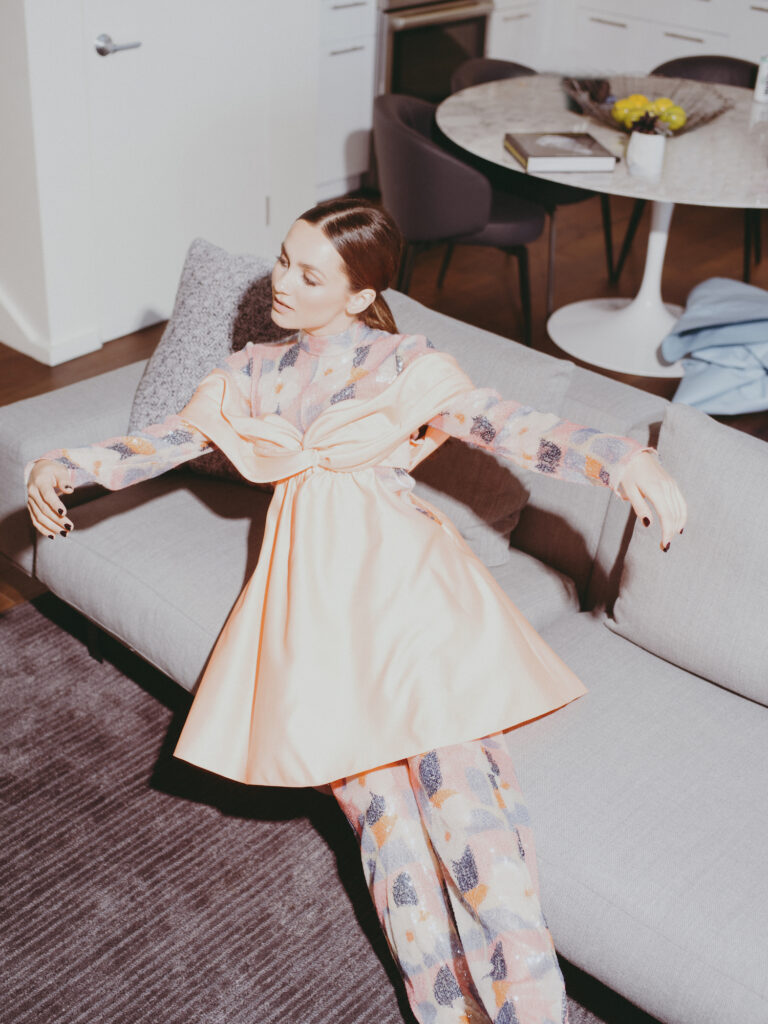
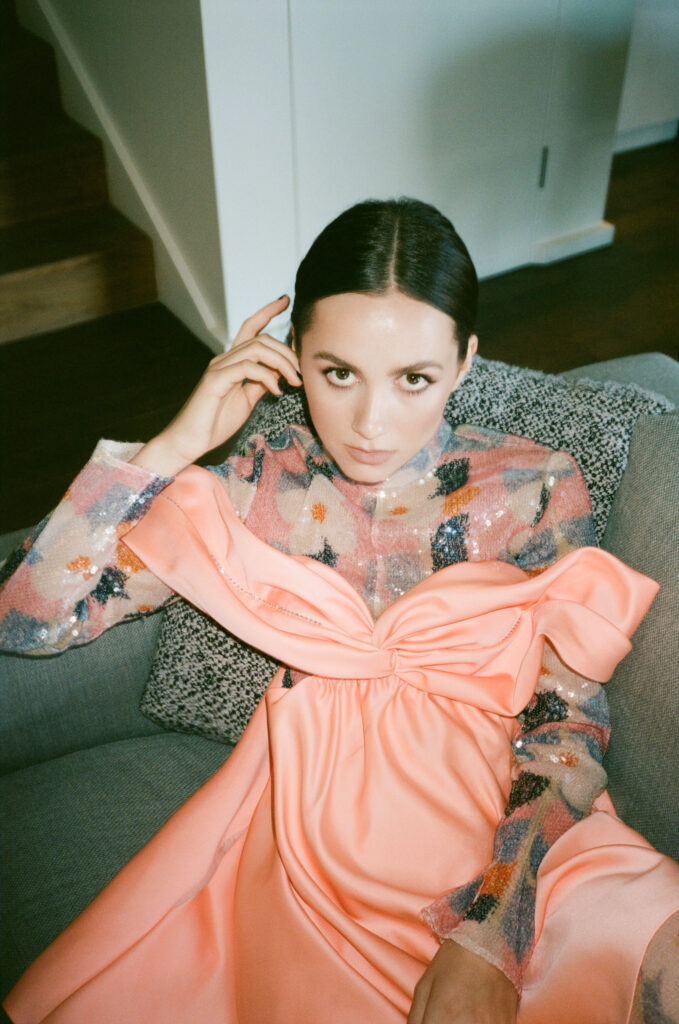
LA: Someone close to me has severe OCD, and that terror of thinking or doing the wrong thing, and then being responsible for someone dying. In the short, when Alice dies, your character right away feels responsible, it must be her fault. Viewing it within an OCD framework adds another level of heartbreak – the intrusive thought that you can be responsible for horrible things occurring. Watching the horror of your character re-counting Alice’s pills, so certain the death had to be her doing.
MA: That’s actually what we were thinking when we were writing. Because both of us have struggled with OCD in the past. And we’re trying to figure out a way to put that in there, but to make it like a little bit light-hearted too at the same time.
LA: After selling us that she’d never steal from Alice, I love how, when Alice literally falls dead face first into her food, your character releases the pearls in her hand, she had stolen. [both laugh] But it’s also tragic how a young woman holds her self-worth, showing up to allow this guy to be abusive, and all the perception of being guilty while trying to be responsible – but being horribly irresponsible out of an array of conflicting motives or sources. Stealing for compensation. It’s a pretty complex, intense mix, you wove a lot of threads within this. How long is the film?
MA: I think it’s like sixteen minutes maybe?
LA: Have you entered it in any of the festivals? I know it played in the Santa Barbara Film Festival.
MA: I think it might be longer than sixteen minutes. We definitely realized that it was pretty long – which definitely got in our way, the limit for a lot of those festivals, they want it to be about twelve to thirteen minutes. So we felt like, maybe next time we’ll make it a little bit shorter, so we can get into more festivals.
LA: I was a judge at the Sapporo Film Festival, which is in Hokkaido. It’s one of the best short film festivals, and it’s great in every way. I think they’d really love your film. They would really appreciate the humor and the dark edge to it. So, that’s something to consider. I can put you in touch with them, I know how they operate has been affected by COVID, but I am sure they will have a creative response to keeping the festival going.
MA: Japan is my favorite place on the planet and I would love that.
LA: Have you ever been to Hokkaido?
MA: I haven’t! I was supposed to… Hokkaido has good skiing? Or am I getting it confused?
LA: Yeah they get a lot of snow! Hokkaido has everything. They’re kind of like Mendocino, lot of farms, they have the best milk too.
MA: It was so beautiful there – I was looking into it earlier in the year. I was in Japan in January, right before the Corona virus got bad everywhere. We were trying to go to other places around Japan and ended up not having enough time, with work. But I was looking into that earlier this year.
LA: What are you writing or working on now?
MA: I dropped out of school in my sophomore year and started working pretty soon after. Olivia, she’s been in school, she’s graduating now.
LA: Oh my God, she’s class of 2020!
MA: Yeah, with a virtual commencement. It’s like a nightmare. But we’ve been working now that she’s been home, which has been really nice. We’re trying to work on a feature screenplay. Hopefully we’ll get it done. But yeah that’s what I’ve been working on now, in terms of writing.
LA: It’s fun working with someone, I have a writing partner and have done screenplays, I really enjoy it. Do you guys use Final Draft? How do you work together?
MA: We usually use Final Draft and then we’ll write together in the same room. But now that we’re not able to see each other, we’ve been going on Celtx, and you can be on the same document at the same time and work on the screenplay, which is really cool. But I love working with a writing partner. I find sometimes when I’m alone, I’m over-thinking everything and then I can’t get a word out and then I crash. It’s nice to work with a partner who feels a little bit more fun and light.
LA: I always compare co-writing to playing tennis, first of all you need someone who can really hit the ball back. It took me a long time to find someone I can count on to hit the fuckin’ ball back. And if I can’t even hit the fucking ball [both laugh] – like you try to serve but keep hitting the net – if you have a good partner, then you can get it in volley and you got a game going, now ya can play!
MA: Yeah, I feel like we are good match. Because the things that I lack, she has, she’s very organized, she’s smart about things that I’m not. I’m lucky that we can work so well together and figured that out kind of early on.
LA: Yeah it’s great to work with someone where you have really good counter-balance. Not too much alike and not too dissimilar. And I loved watching you and Lena Dunham when you were on Girls! They’re doing an audiobook of the re-release of The Heart Is Deceitful Above All Things short stories. And Lena is going to be doing one, which is like uh… HASHTAG HUMBLED HASHTAG BLESSED. [both laugh]
MA: Lena’s the best. I love Lena!
LA: Oh fuck! Yeah! I met her at Sundance, and she was pure ebullient joy! On Girls, I loved your interaction and how you guys organically flowed… How much of that was improv?
MA: I don’t even remember. But Lena was the reason I even wanted to make a short film. I met Lena when I was like twelve, and getting to see her be able to direct and write and act in her own stuff…
LA: Fearless! Fucking fearlessly!
MA: Right! It was very inspirational to me, growing up and thinking, “That’s possible?”
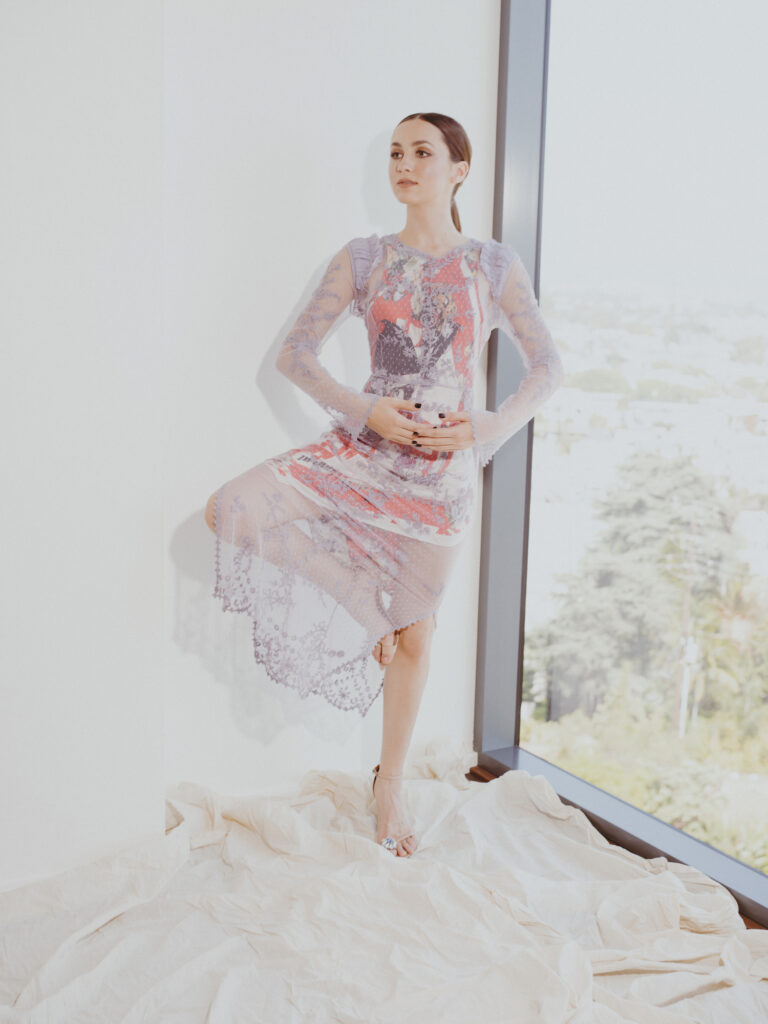
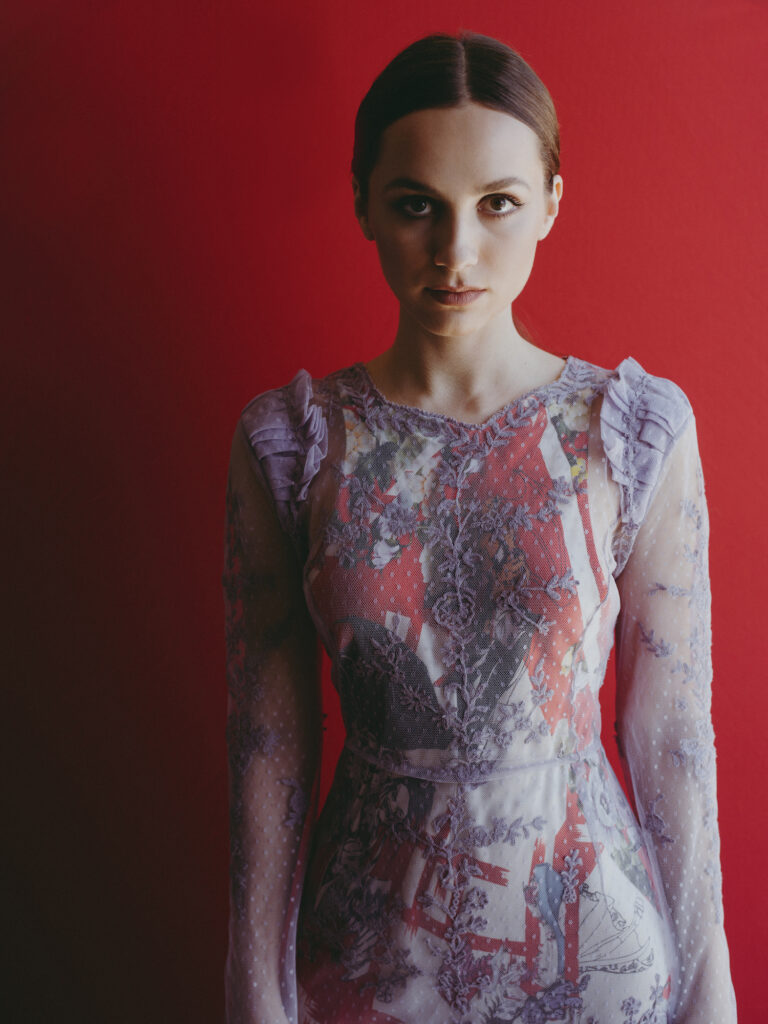
LA: YEAH!
MA: And my dad was always really encouraging. And I don’t know, she’s part of the reason I want to write, direct and act…
LA: I love that you are part of this wave of women who don’t need to ask permission. There are always people saying, “You can’t”, and it’s like “Why not? Why can’t I? Watch me!” And of course I can. I’ll just tell you, I entered a script into Sundance with my writing partner and we were so fucking stupid, we made it clear we were sticking to our lane, we considered it a plus. We were like, “Of course we wouldn’t direct it. What right would we have?” We had made the cut through a couple of rounds, but all the women they chose that year were women who were writer/directors. So, if we had believed in ourselves and said, “Oh of course we have permission to learn…”, maybe we would of gotten a chance to make it. So it’s so wonderful to see your generation being like “Of course I can fucking do this! Of course!”
MA: Yeah! Lena and like Phoebe Waller-Bridge too, like all of these women doing it successfully. And I don’t know, it’s just there’s something different about it, and it feels so personal too. I think it’s very inspirational.
LA: And speaking of a strong female role, I was very impressed by your nuanced portrayal of Claire, Scott’s sister in The King of Staten Island. I really was moved by that whole story. It skates this line, like when Scott tattoos a kid… [both laugh] I was just like, okay deal-breaker, but then the story unfolds, allowing a context, and it actually worked. I was like “Wow!” Okay I’m getting the trauma and witnessing this painful healing, and it’s not sappy. Or pretty. But it is funny the way life can be in midst of the tragic. The performances, the humor – it was really effective, very moving. Were you around when your dad was working on that?
MA: When he was like writing it? I was there, I mean I guess – I don’t even know actually when my dad and Pete Davidson started working on it. But I remember meeting Pete probably like five years ago, and then I guess he’s been around and my dad’s been working with him. It all started becoming real a year before we shot last summer. It was cool because we shot it on Staten Island, really close to where Pete’s house is, and his mom was there and his sister Casey who I was playing like a fictional version of. He has a really nice group of friends and a lot of them are involved in the movie. His friend Marcus was the videographer, his best friend Dave co-wrote the movie with him, and Ricky Valez who’s in the movie is Pete’s real life best friend. So it felt very personal, and obviously the story is so personal to Pete.
LA: It felt very true to life. And one thing that you’re always good at, in allowing a character to, as Milch would say, rest transparently on the grace that gave them rise – it’s like a conflicted person having a transparency that allows these conflicting emotions to exist. That seems like a through line for all the characters, whether it is Henrietta in Hollywood or Lexie in Euphoria. I’m always amazed at how I can always just watch your face – you know how you experience an earthquake and it kind of rumbles through or rolls? Without saying a word, your face and your being allow you to roll through a range of different emotions.
MA: Oh that’s so nice, thank you!
LA: I’ve heard you talk about your parents both saying to commit when acting, and it seems to me that you don’t have that issue – whatever character you play is already fully realized inside you, inhabiting. David Milch would call it transmigration of spirit. You know, you’re just fully within that.
MA: I think that’s like the most – my mom said that to me, she always said to fully be in it. And as someone who can have such a bad stage fright and be so nervous – I’m always over-thinking everything – that’s kind of the best advice I’ve gotten. Because only that can take me out of my head. If I do enough preparation and feel prepared, then I can let go of all of that negative self-talk and over-thinking, and try to be present – which I’m glad it seems like I am! [both laugh] I don’t know if I’m pulling it off, but thank you, that’s really nice.
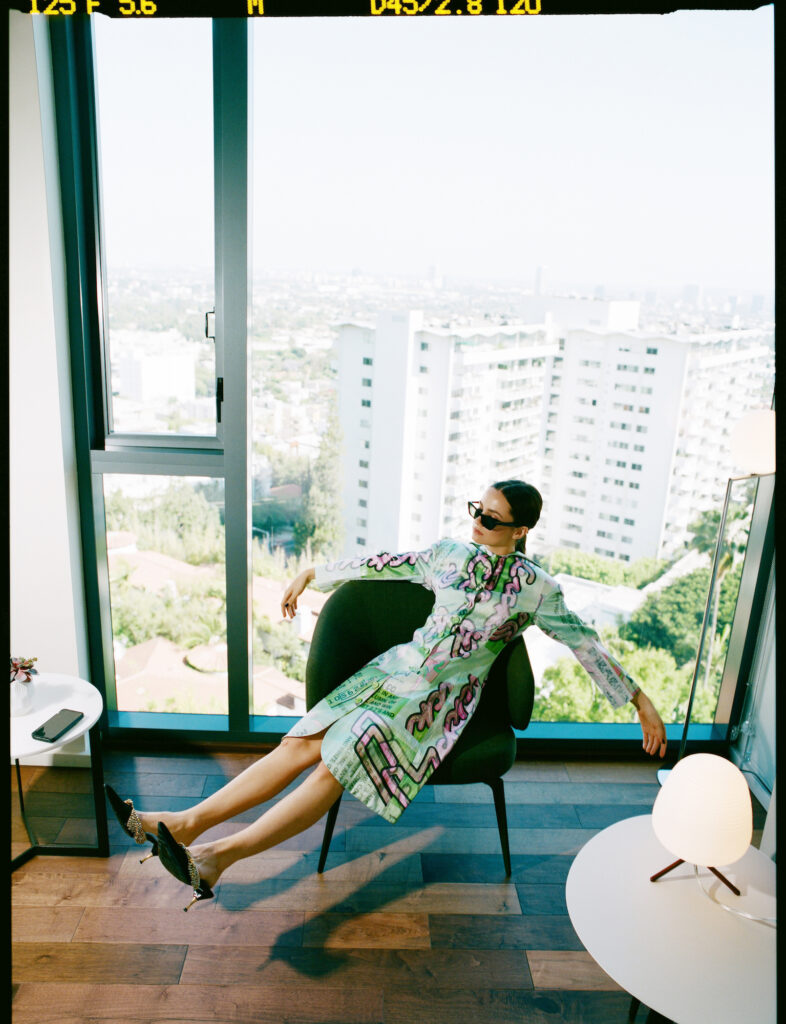
LA: It definitely comes across, and I think that can be the gift of being a writer and a director, you have to be so… That moment when you’re writing and you just have… You know in all those junkie movies, when they put the needle in and you see them get the return, right?
MA: Yeah.
LA: That to me is when you’re writing and you have lift-off, when you know you’re in the vein. It’s like that, you’re completely locked in.
MA: Right. And that’s how I’m feeling about acting too.
LA: Yeah!
MA: Yeah 100%! Like you almost black out because you’re fully in it. That’s what I hope I can get. It doesn’t always work, but when I can, that’s when I remember that I love acting, when that happens.
LA: That is what came across when you’re being the sister in King of Staten Island. At the end of that scene where you’re walking away from Scott, you convey such a heartbreaking range of emotions.
MA: We shot that scene all night. It was the hottest weekend in New York that summer, it was 110 degrees or something crazy. At nighttime it didn’t cool off that much. I remember being really hot, hoping that would help me seem drunk cause I was like woozy from overheating. [both laugh] Pete is very present when you’re acting with him, he’s just right there with you the whole time. I don’t know if that’s because a lot of the scenes are very personal to him. He’s just locked in, so it was really fun acting with him. It was felt. We were pretty connected and ready to go.
LA: Yeah, you felt like brother and sister, you really did.
MA: Yeah, he was really, really good to work with.
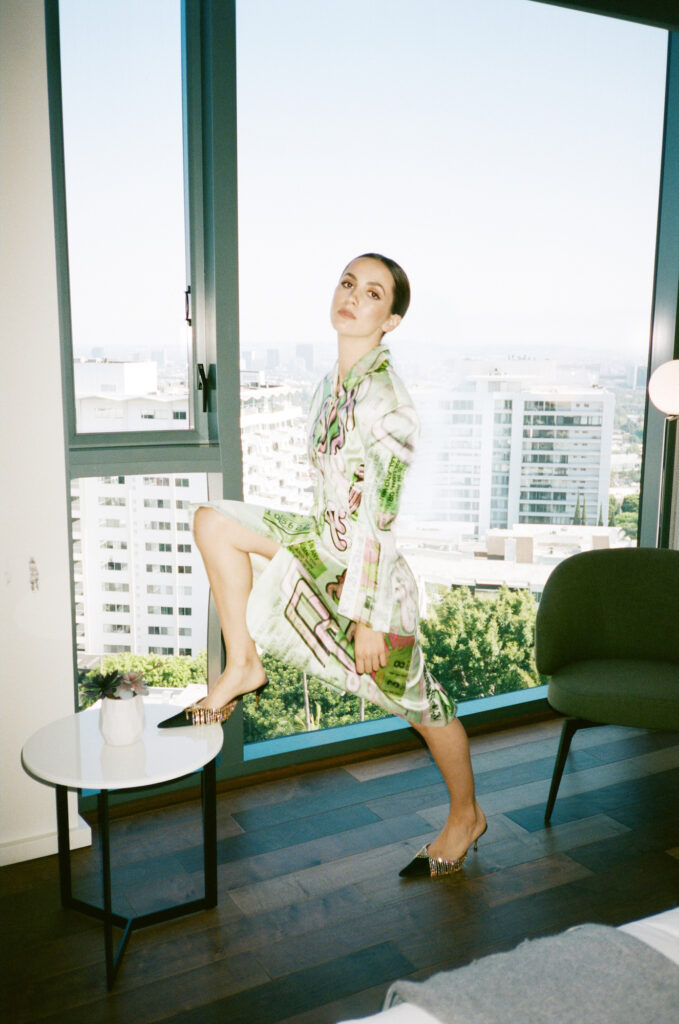
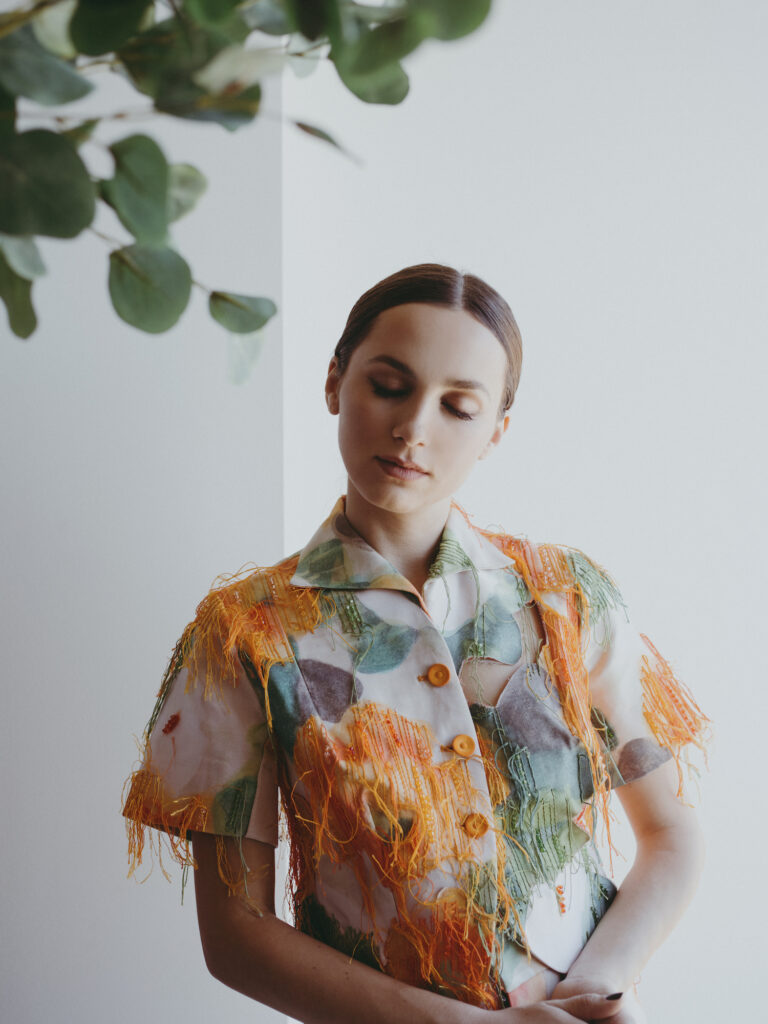
LA: It was a very good combination and very good chemistry, you felt like this was a lived-in connection. I also want to ask you a couple of questions about Ryan Murphy’s Hollywood on Netflix. Not every actress can fit into the landscape of 1940s Hollywood the way you are able to. First of all, who did the costumes?
MA: Sarah Evelyn and Lou Eyrich, I think they do almost every Ryan Murphy show. They’re incredible, Lou and Sarah had racks and racks of the most beautiful vintage dresses. They are amazing.
LA: Did you have fun wearing the clothes?
MA: Oh my gosh it was so fun! Just even seeing the clothes at the Oscars scene at the end that I wasn’t in, I remember those days. They just had so many ‘40s gowns, it was very cool.
LA: Now, Maude you gotta say that better: “That Oscar scene I was totally not fucking in!” [both laugh] And the ‘40s hair! How long did your hair take?
MA: It’s kind of crazy cause I’ve never done any type of period piece. But all of the hair and makeup people are incredible with special effects, they can do these crazy prosthetics – it’s like a different world. I think Ryan Murphy uses a lot of the same crew on his projects, and they’re like a well-oiled machine, just super-efficient and so good. All of the hair and makeup people and the costume people, it just felt like a really good working experience.
LA: Were you guys shooting Euphoria when COVID hit?
MA: We were about to go into Season 2. We had our table reads and our screen tests. I think we were supposed to shoot the week after everything locked down. We were building up to it and ended up not being able to shoot it. But I think we will go straight back, as soon as we get the okay. We’ll see.
LA: I was talking to my friend director Daniel Minahan, he did Deadwood and Game of Thrones –
MA: He directed Hollywood!
LA: Yeah he did episode two of Hollywood, so you know what a sweetheart he is.
MA: He’s so nice!
LA: Wait, I’m going to read you what he wrote. Daniel said, “Maude is a sweetheart. It was my first time working with her, she’s just a very authentic person, very intuitive actress.” We like chatted about you, so it just seems that everyone who’s worked with you really loves you. Word is sweetheart that there aint no bullshit about you! [both laugh]
MA: That’s so nice of him to say that. He was such a good director, he really cared and called me and wanted to talk through everything, I really appreciate it when people put in that time and wanna go through it. I loved working with him. He was great.
LA: Weren’t there sex scenes in that episode?
MA: It was a brief, but more of a sexual interaction than we had any other time on the show. He was very good at making it comfortable.
LA: Yeah, if there’s anyone you want to do that with, it’s him. Talk about making you feel safe, you know?
MA: Totally.
LA: He’s really loving. But let me ask you this, what is it like being Bob Ross? [both laugh]
MA: It might have been a week and a half of all-night shoots, and we were all on set at the same time, all night, for almost two weeks. And I just have this beard on, I don’t know I was living my best life in my Bob Ross outfit! [both laugh] I was glad I didn’t have a big makeup look and didn’t need to get any touch-ups. But yeah, we had a lot of fun with that.
LA: And then Drake comes on the set! I love that picture of you with Drake.
MA: That literally haunts me! Super funny! [both laugh]
LA: It was epic! Did you know Drake was going to be there?
MA: No, that’s the part that threw me off so much. He just appeared and I turned around, I was like oh God, why today? He was really nice.
LA: That’s really awesome. I’m so moved to be able to talk to you, and I’ve loved watching you blossoming into being a writer-director, and making it clear there’s absolutely nothing you can’t accomplish. And I’ve no doubt that whatever form creativity takes and how everything post-COVID changes, you will be able to adapt and create phenomenal art and inviting in unrepresented voices.
MA: Thank you so much! That means so much.
LA: Give your dad my helloes, and your dad is right, you’ll absolutely love Deadwood.
MA: It was so nice talking to you. Thank you, you said some nice things. It means a lot, so thank you.
LA: Well, it’s apparent. You’re luminous and you have good-hearted, well grounded grace and humor. I look forward to seeing what else you keep creating. And just NEVER let anyone tell you no!
MA: Thank you so much!
LA: What I would suggest to you, what is available to you, is the more you go into your writing and directing and explore that point of kryptonite, that pain, in your humor, you’re creating a point of healing not only for yourself but for others as well. They’ll get the harmonics, they’ll get it’s there. Because it’s very apparent to me.
MA: I don’t even know what to say. Thank you!
LA: David Milch would say, how do you take problems of the soul and the spirit and transform of them into issues of craft or technique, so people can see and feel and care about what they did not before. So if you feel stuck on something, it’s not just you. Then how do you take what you’ve been blessed with, the craft and technique, so you can turn it into story, in the most honest available way? Doing that creates a bridge for other people to connect, and you are that – you are able to allow people to through you to understand the complexities. It’s not one way or the other. It’s complex contradictory emotions. Because someone either had to be a good smart girl or that’s it, one or the other. You have permission to inhabit many different contradictory ways of being a young woman, and that uplifts an entire community. So anyway, we’ll be in touch, and Dan sends his love. You know… to be continued!
MA: Please, it means a lot. Thank you!
As this interview was conducted prior to the tragic death of George Floyd and epic protests, against not only police brutality but also systemic racism and inequity in the world, we felt it was important to catch up with Maude and discuss the current climate.
LA: How do you think the impact of the Black Lives Matter movement and push for change will be reflected in the films and television?
MA: I hope to see more inclusive work environments and will continue to use my voice and platform to support and champion this movement and diverse voices. It is also more important than ever to register to vote so we can win back the senate, the presidency and fill our government with people who aren’t afraid to make the changes that are long overdue.
Photography | Shane McCauley
Interview by Laura Albert
Creative Director & Fashion editor | Deborah Ferguson
Web Layout | Allie King
Interview transcribed by Fotis Tzanakis
Social distancing beauty team consultants
Makeup | Kelsey Deenihan @ The Wall Group
Hair | Lona Vigi @ A-Frame-agency
Social Distancing shoot Location provided by |
STAY ![]()
Thank you Narrative PR!
Maude Aptow in film “The King of Staten Island”
